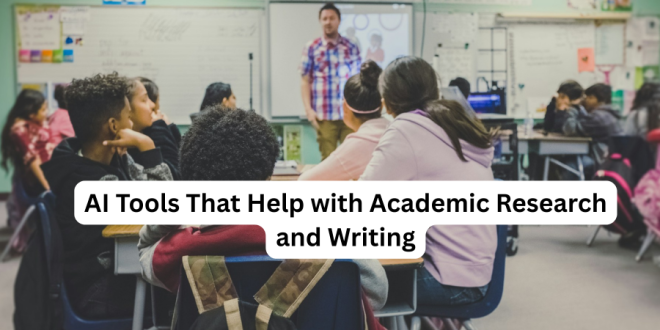Academic research and writing can be time-consuming and mentally exhausting. But in 2025, AI tools have become powerful allies for students, educators, and researchers. Whether you’re crafting a thesis, conducting literature reviews, or checking grammar and citations, AI can save hours of work and improve your accuracy.
In this guide, we’ll explore the top AI tools for academic writing and research, how they work, and how to use them effectively.
📚 Best AI Tools for Academic Research
1. Semantic Scholar
Purpose: Research Paper Discovery
Semantic Scholar uses AI to understand the context of your topic and recommend relevant, credible sources. It’s free and ideal for finding scholarly articles across multiple disciplines.
✅ Pros: Fast filtering, citation graphs, topic summaries
🔗 Visit Semantic Scholar
2. Scite.ai
Purpose: Citation and Evidence Analysis
Scite.ai goes beyond showing citations — it tells you how a study was cited (supporting, contradicting, or mentioning). This helps you judge a study’s credibility and impact at a glance.
✅ Pros: Smart citation context, browser extension
🔗 Try Scite.ai
3. Elicit by Ought
Purpose: Literature Review Assistance
Elicit is a game-changer for conducting AI-powered literature reviews. Just enter a research question, and it finds the most relevant papers with summaries, methodologies, and insights.
✅ Pros: Saves hours of manual reading
🔗 Explore Elicit
✍️ Best AI Tools for Academic Writing
4. Grammarly
Purpose: Grammar, Style, Clarity
Grammarly has become a must-have for students. It uses AI to suggest clear, concise, and academic tone edits, while detecting grammar errors in real-time.
✅ Pros: Chrome extension, free plan, academic tone detector
🔗 Use Grammarly
5. Quillbot
Purpose: Paraphrasing and Summarizing
Quillbot is ideal for rewriting and paraphrasing content while preserving meaning. It’s especially useful for reducing plagiarism and improving flow in academic writing.
✅ Pros: Paraphrasing modes, summarizer, citation generator
🔗 Try Quillbot
6. Zotero
Purpose: Reference Management
Zotero helps manage and format your references and bibliographies. You can store PDFs, take notes, and automatically create citations in APA, MLA, and other formats.
✅ Pros: Open-source, integrates with Word and Google Docs
🔗 Get Zotero
7. ChatGPT (for Brainstorming & Drafting)
Purpose: Idea Generation, Outline Creation
ChatGPT (by OpenAI) helps generate outlines, thesis ideas, summaries, and even first drafts. While you should verify sources and facts, it’s an excellent academic writing assistant.
✅ Pros: Fast drafts, clarification aid, brainstorming support
🔗 Use ChatGPT
⚠️ Tips for Using AI Ethically in Academia
- Always cite your sources – even AI-generated ideas need attribution.
- Don’t rely solely on AI for facts – verify every claim.
- Avoid plagiarism – use AI to assist, not copy.
🧠 Final Thoughts: Work Smarter, Not Harder
AI tools are revolutionizing the way we research and write academically. Whether you’re a student writing an essay or a PhD candidate working on your dissertation, these tools can streamline your workflow, boost your confidence, and help you write smarter in 2025.
 UBUCH ubuch | Honest Tech Reviews & Tutorials for Everyone
UBUCH ubuch | Honest Tech Reviews & Tutorials for Everyone




